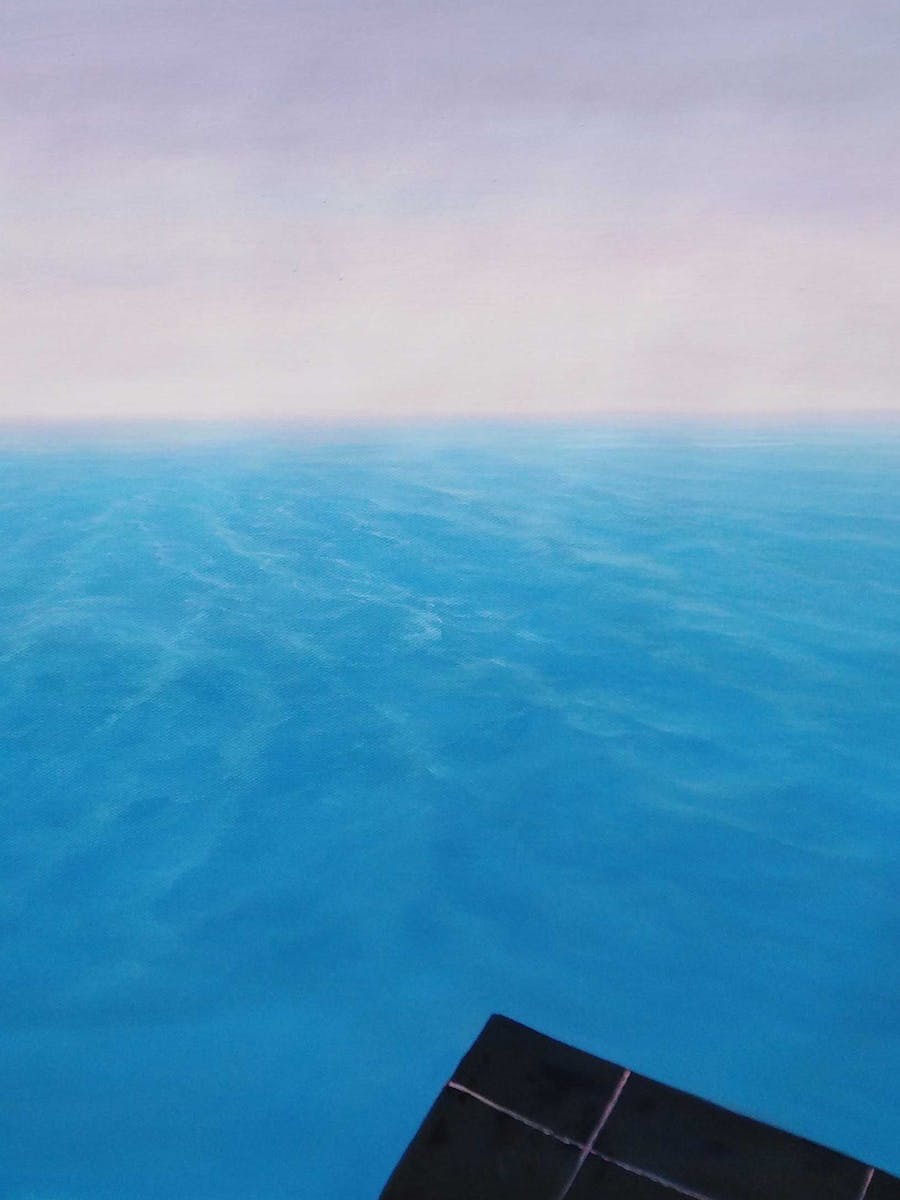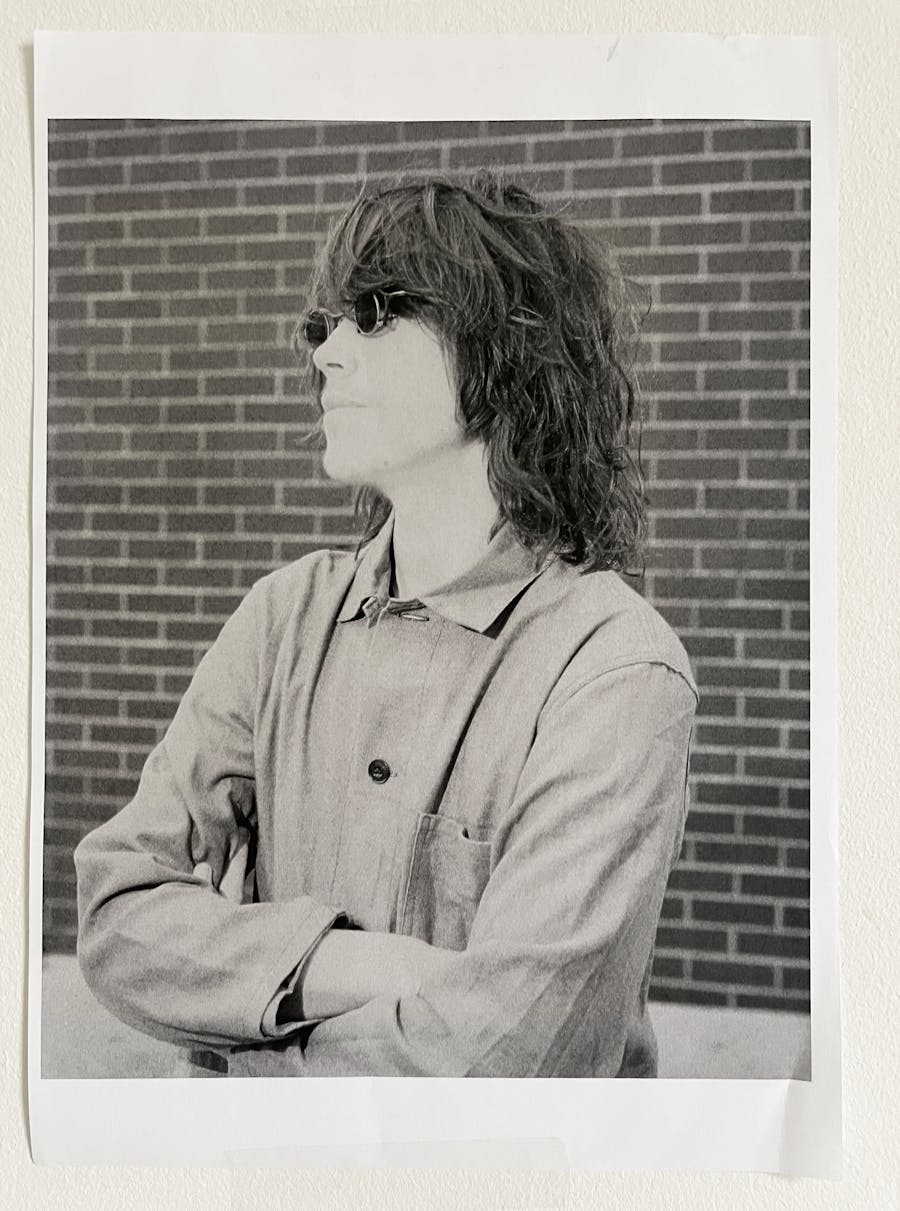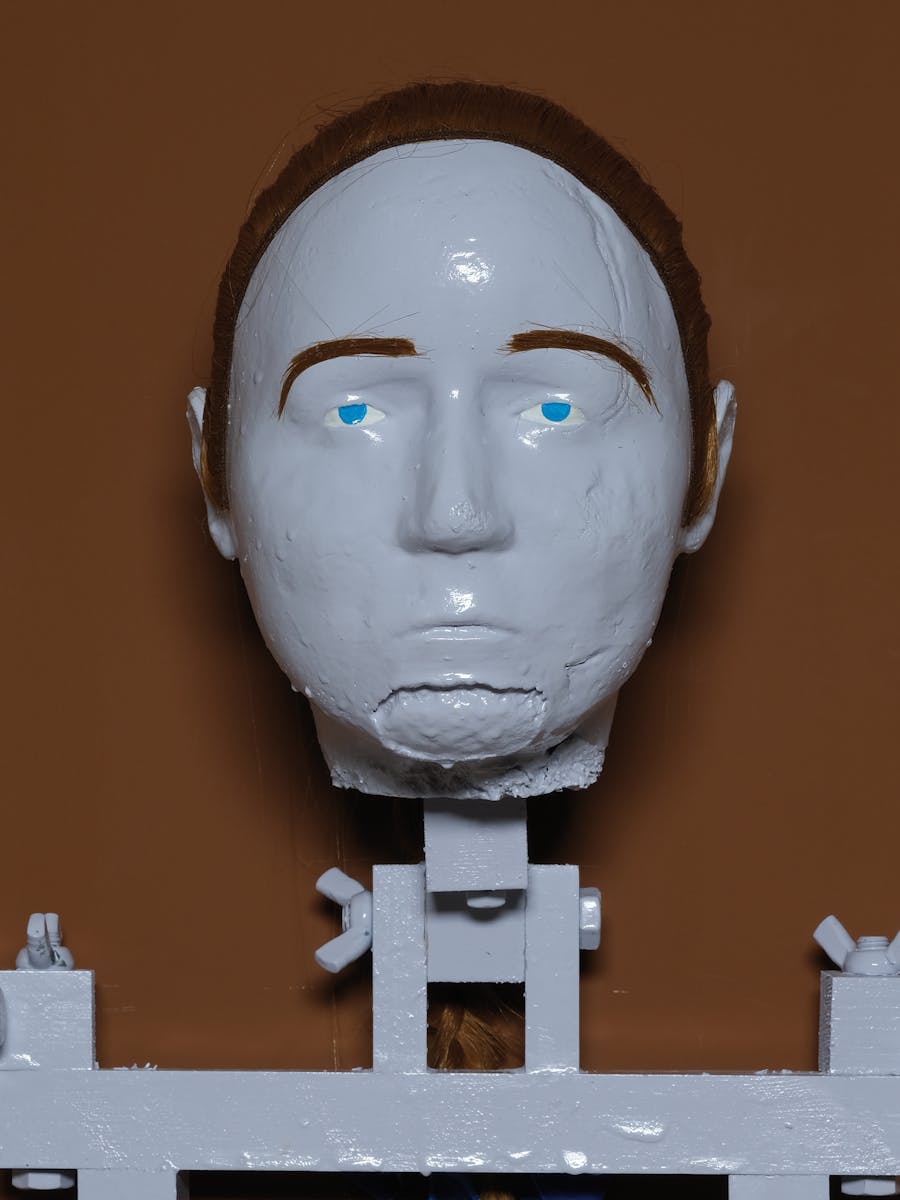It was then, when populist regimes were taking hold across the globe, when fault lines were opening up everywhere around identity, around gender, generation and class, when grievances were growing and crystallizing, that they knew they had to leave. A handful of women, men and children set off on their carbon-neutral caravel, fleeing the pandemonium of a world gone mad.
This was the plan: taking only what was strictly necessary, they left behind them their gilded lives, their cars and electric scooters, their electronic devices, savings, stock options, Instagram accounts and 5G.
For this peregrination, they kept only a few books which each intended for their desert island. But, above all, they took with them the complete works of Jacques Derrida (1930-2004), 43 books assembled in several volumes, bound in Morocco leather, safely stored in a locked, watertight, fireproof trunk.
They came from different walks of life, belonged to different generations and genders, had different social and cultural origins and different sexual orientations, but they all shared a common desire to make a new start, liberated from multiple different forms of domination. They found themselves dockside with no regrets, at the dawn of the first day of the rest of their lives, and weighed anchor, setting a course for the West.
An epic crossing. Confronting hostile winds, they endured every misfortune imaginable – sea sickness, gastroenteritis, dysentery…without the help of pharmacology. While others would not have hesitated to throw the sick overboard for fear they would contaminate the other passengers, they faced the situation together. Nobody died during the journey. There were even new arrivals who brought new blood to the colony. The group’s resilience was greeted as a good omen, testifying to the soundness of their enterprise.
The long-awaited coastline was finally in sight. Their vessel hugged the coast of South America. They dropped anchor at Rio de Janeiro, launching skiffs better adapted for river navigation. They plunged into an ever wilder, ever more verdant continent.
When they found the place, green and uninhabited in the heart of Paraguay, about 150km north of Asunción in the region of San Pedro, they knew they had arrived. Far from the hyperconnected civilization alienated by centuries of determinisms and rifts, they decided to found a new civilisation, under the aegis of the great Jacques. They hesitated between several names – Civilization2.0, New Aurora, DerridaPark, but finally they agreed unanimously to call it DECONSTRUCTIONLAND.
***
The children frolicked in tall, vanilla-scented grass, and everyone set about making the place liveable. All of them, big or small, strong or ailing, man or woman, put their shoulder to the wheel. Despite the harshness of the labour, some felt a ludic pleasure in it, comparable to that of playing Sim City or Civilization on their consoles or computers. Others experienced the same delight as when reading Robinson Crusoe, Ovid’s Metamorphoses, L’Astrée or the poetry of Virgil…But tenfold, because it was illuminated by the splendour of the true.
Settlements had to be built, and crops grown to provide subsistence for the entire community. When night fell, everyone went to sleep, happy and exhausted, slumbering, with a smile under the starry sky, all living together in carefree harmony.
***
Once the survival of the group was assured, they had to start organizing the project for whose establishment they had braved the elements: laying the foundations of a new civilization. And thus giving the world a new hope, proving that it was possible to live inclusively.
Of course, others had already tried to do so in the past, on the edges of the world, but they had always rallied around a belief system, a religion, a charismatic leader, or a simple refusal of civilization.
This was different. What they were trying to do was actually the exact opposite of those prior attempts. They intended to re-establish civilisation outside of any belief, any religion, or any charismatic leader. If these things sometimes manage powerfully to solder a group together, it is always to the exclusion of others.
They carved their Manifesto into stone. It spoke of their desire to return to the dawn of time, to reconstruct a single, indivisible humanity through giving life to a new generation freed from the old beliefs, the source of the determinisms and dualisms which had hitherto held the world in thrall, dividing and opposing ever more bitterly the men and women of the whole world.
***
And for that, they had found their modus operandi, the tool of their liberation. Not cults or leaders – never cults or leaders – but a tool to use collectively: deconstruction. As Derrida had advocated, they were going to liberate themselves from alienating paradigms, from all the ‘Platonisms’- in other words all the hidden dualisms - that were eating away at civilization. For all those dualisms are oppositions and necessarily produce hierarchies, which in turn necessarily produce oppressions. How could people not see the fatal subjections implicit in the couples man/woman, white/black, visible/invisible, soul/body, West/East, North/South?
Deconstruction would be their tool of renovation. They had to deconstruct if they wanted to reconstruct everything.
***
Language first of all. There was no reason for one language to be privileged over another, and especially not English, even if everybody, or almost everybody, understood it – not this globalized lexis which had imposed itself, the fruit of military, then economic imperialism. All together, then, they developed a common dialect, a mixture of all extant languages which evolved organically, enriched with the language of children, becoming a collective playground, a collective creation and recreation. They succeeded in creating an Esperanto which everyone understood, so eager were they to produce a common language.
They took the opportunity to get rid of grammatical gender, since in DECONSTRUCTIONLAND they no longer wanted to separate and hierarchize according to this principle, as had been the case in civilizations under the sway of patriarchy. And of course the female/male equality they practised needed to be reflected in language (given that this was one of the elements, amongst others, which had constructed and legitimized that inequality).
Similarly, when it came to habitation and town-planning, they opted for communal dwellings and everyone could sleep where they wished, thus avoiding the recreation of bourgeois attitudes around family. Deconstructing capitalism, and relations of alienation and domination, also meant liberating themselves from family relations.
Everyone dressed as they pleased. No type of dress was imposed, nor was there any cultural appropriation. Neither partial nor total nudity was prohibited.
In terms of education and teaching, priority was given to unlearning, because above all it was important to unlearn what had been taught. In improvised lecture halls under the foliage, on the shores of the lake, or in the shadow of the silos, they set about unteaching all subjects: history, geography, the hard sciences and humanities, philosophy… and literature above all. They untaught Homer, Dante, Shakespeare, Molière, Cervantes and even Joyce, all carriers of hidden dualisms. When evening came, to send the children to sleep they untold them stories, taking apart the narrative and ideological machinery of the old tales. The whole patrimony of fairy tales went through this process. Recent pop culture phenomena too were taken apart and scattered to the four winds. Like the Aristocrats, for example: it had become unthinkable that the kitty cats should swoon at the idea of marriage – which no longer existed – or that the toms should engage in a competitive display of outdated virility by fighting under the amused eye of their mother…
***
In a celebratory game of skittles, they demolished with one voice all the paternalisms, all the colonialisms, all the capitalisms, all the generationalisms, all the genderisms – in short, all of the ostracisms based on colour, on gender of the past. Everyone was in agreement. Unanimity reigned, of a sort they had never before encountered in their AGMs, their neighbourhood committees, even their respective start-ups, in fact nowhere in their previous civilization. Now everything was different. It was as if they were in zero gravity, in a laboratory where they could put into practice their inclusive ideal.
***
It was an era of incredible happiness.
***
Afterwards, the rain came. It came without warning. Sudden downpours which would swell into deluges, then floods. The colony was devastated in just a few hours. They had to flee to the neighbouring mountain, which was fortunately full of caves. A troglodyte miracle. But this also meant they had to separate. Everyone, responding to a survival instinct, naturally drew nearer to those with whom they shared family ties or a cultural, linguistic or sexual affinity.
Then the sun came back and the waters ebbed. Everyone emerged from their caves and their nightmare and could go back down to the colony.
They wanted to pick up where they had left off. But nothing was like before.
It was as if the magic of collective deconstruction had left them. They struggled on with the work but something that could not quite be identified made it all mechanical. It was an era of generalized suspicion.
Every thought, every act, everyone’s every word was deconstructed with a fine-toothed comb.
Every aesthetic judgement was condemned: to say that something was beautiful, or that a person was attractive, was necessarily to deprecate – or rather denigrate – other things and other people…Every preference is to the detriment of something else.
Laughter was also banned. For laughter is always to the detriment of someone and often to that to the weakest. Even humour considered as a weapon of defence against the powerful – like caricature, for example – ratifies that power dynamic.
Irony was excluded as being wholly exclusive in its very functioning. By addressing itself, by its very nature, to the happy few, perceptible only to those in the know, irony naturally leaves to one side those who do not understand and creates a connivance prejudicial to others.
Thus language itself, the foundation stone of their new civilization, was affected. Suddenly the colonists no longer understood each other. Even if they were speaking the same language, they became mired in byzantine quarrels about the meanings of the most trivial words, sometimes uncovering an infinity of latent senses. As if all the words, even the most familiar, had lost their ability to convey meaning. What had started off as Esperanto became Volapük.
Every form of artistic and intellectual activity, whether painting, music, writing or even reading, was condemned as a form of egotistic personal expression, damaging to group cohesion. They burnt books, paintings and notebooks.
The most minor everyday gestures became suspect: helping someone – holding back a branch for them in the forest, for example, to let them pass – was construed as demonstrating that you considered them inferior, since you assumed they needed help – not to mention that it subsequently established a relationship of dependence, even domination. A touch, a smile, a look in someone’s direction – all were classified as displays of preference to the detriment of others. People avoided saying good morning and bidding each other goodnight.
Finally, it became completely impossible to express by thought or gesture any preference – whether friendly or, especially, romantic or erotic – because that was to create a hierarchy and to exclude the rest of the community.
Solidarity, friendship and love became, in these sad tropics, sad tropisms.
***
When the anthropologists arrived to study the site, there was no sign of life. They were intrigued by this form of settlement – completely evenly distributed – which they had not encountered anywhere else in the world. They baptized it a monadic biotype. Houses all in a row, as in a park. Everyone had died at different ages. All the more terrifying was that there was no trace of violence. A lava-less Pompei, a Solar Order without bloodshed. The corpses were in attitudes that suggested that they had not died as a result of violence, but rather as result of boredom and solitude. What could have frozen them in such positions? They asked themselves without finding an answer. It was an enigma they could not solve, since no writing or drawing was left.
***
Discombobulated, the scientists left the site as one flees an accursed land, without looking back. Consequently, in their retreat, they did not see the frontispiece which crowned the entrance, almost eaten away by nature, which had reclaimed its rights.
You could just about make out what had once been written there: DECONSTRUCTIONLAND. Yet as a carnivorous plant had devoured a few letters, so from a distance it would have read DE…STRUCTIONLAND.





